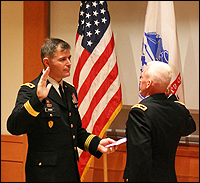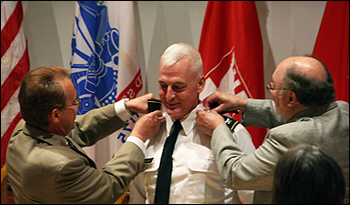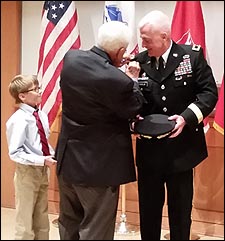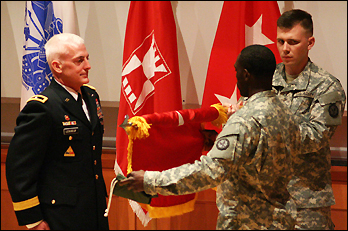Eugene J. LeBoeuf’s Vanderbilt colleagues, his friends, neighbors and family witnessed a moving promotion recognition ceremony June 27 at the School of Engineering when the professor was honored as the Brigadier General of the 416th Theater Engineer Command, U.S. Army Reserve.

LeBoeuf, a 29-year Army veteran and formerly the unit’s chief of staff, was promoted from the rank of colonel into the role of the 416th TEC deputy commanding general in an earlier ceremony in Darien, Illinois, the unit’s headquarters.
“The selection for promotion to brigadier general is an extreme honor that truly can be attributed to all of the soldiers I have had the pleasure to serve with throughout my career, the unwavering support of my loving family and friends, and of course the tremendous support of my friends and colleagues at Vanderbilt University,” LeBoeuf said.
LeBoeuf is a professor and the associate chair of the Department of Civil and Environmental Engineering, and the department’s Director of Undergraduate Studies. His research focuses on water quality and water resources, such as sustainable-energy water systems and optimization of multi-reservoir hydropower systems.
“I honestly cannot think of anything I would rather be doing – serving as an educator at a world-class university such as Vanderbilt, with the opportunity to also serve in the U.S. Army Reserve!”
“It was Gene’s wish to share this honor with his engineering and university colleagues, his friends and family, in order to thank them for their unwavering support,” said Major General Lewis G. Irwin, the 416th’s commanding general, in opening remarks to 90 guests.

“The promotion to Brigadier General is a monumental accomplishment. It is a very selective and prestigious rank,” said Irwin, who explained the lengthy process. Eligible officers are screened by a promotion board from their branch of service. The list is sent to the service secretary and the joint chiefs to review before it is sent to the President, through the defense secretary. The President nominates the officers and the Senate must then confirm the nominees by a majority vote.
A Brigadier General is a one-star general officer rank. This officer serves as the advisor and deputy commander to a Major General commanding a division, and assists in overseeing the tactical planning and coordination of division operations.
“Serving as a commissioned officer is a true blessing and joy, especially when in command positions. Soldiers and their families are amazingly dedicated and unselfish in their support of their units and their mission. Leading such dedicated women and men of honor is a privilege, and doing this at the general officer level was simply beyond my expectations, Frankly, I am very humbled by the selection,” LeBoeuf said.

Maj. Gen. Irwin conducted the promotion ceremony. Other participants in the ceremony included Vanderbilt Engineering Dean Philippe Fauchet and former Dean Kenneth F. Galloway; LeBoeuf’s wife, Teresa; and children, Lauren and Nathan; and his father, Eugene A. LeBoeuf.
During the ‘unfurling and posting’ of the General Officer flag – a deep red flag with a single white star in the center – two young Army MPs uncased and slowly unfurled the flag and placed in a stand behind Brig. Gen. LeBoeuf. It is customary for the flag to designate the general’s location. Maj. Gen. Irwin said, “It is a sign to our soldiers. The general is here; all is well.”
Professor’s military career
LeBoeuf received a commission through the U.S. Army ROTC program into the U.S. Army Corps of Engineers in May 1985. He earned a bachelor’s degree in civil engineering from Rose-Hulman Institute of Technology; a masters’ degree in civil engineering from Stanford University; a masters’ degree in industrial engineering and management science from Northwestern University; and a Ph.D. in environmental engineering from the University of Michigan. He also earned a Master of Strategic Studies at the U.S. Army War College.
His additional military education includes the Engineer Officer Basic Course, Engineer Officer Advanced Course, Combined Arms and Services Staff School, Contingency Engineering Management Course, Command and General Staff Officer Course, and Advanced Joint Professional Military Education Course.
He has served in numerous command and staff positions throughout his career, including 2d Engineer Battalion (combat); 2d Infantry Division, South Korea; Deputy Area Commander of the Army Corps of Engineers, Nashville District; 12th Engineer Battalion (combat), 3rd Armored Division during Desert Storm; 554th Engineer Battalion, and U.S. Army Engineer School, Fort Leonard Wood, Missouri.

Follow-on assignments include instructor for the Department of Systems Engineering at West Point; a joint billet as Engineer Plans and Logistics Officer, and a number of other command positions in the U.S. Pacific Command in Hawaii.
Awards and decorations include, among many others, the Bronze Star Medal, Defense Meritorious Service Medal, Meritorious Service Medal with Silver Oak Leaf, Army Commendation Medal, National Defense Service Medal with Bronze Star, Southwest Asia Service Medal with Two Bronze Stars, Global War On Terrorism Service Medal, Korean Defense Service Medal, Humanitarian Service Medal, Airborne Badge, Air Assault Badge, and Ranger Tab. In 1989, he was selected as the General Douglas MacArthur Leadership Award Recipient for the U.S. Army Corps of Engineers, and in 2011 was elected Fellow of the American Society of Civil Engineers.
LeBoeuf has published more than 50 technical publications, awarded four U.S. patents, and is a recipient of the U.S. National Science Foundation’s Faculty CAREER Award. He is a registered Professional Engineer in Missouri and Tennessee, and is a Board Certified Environmental Engineer.
The 416th Theater Engineer Command
The Army Reserve has the only two Theater Engineer Commands across the entire Department of Defense. They are the 416th TEC, headquartered in Darien, Illinois, and the 412th TEC, in Vicksburg, Mississippi. The TEC’s three main areas of expertise are assured mobility, general engineering and geospatial engineering.
A “theater” is a term used for both combat and noncombat environments, spanning across multiple countries. The Department of Defense has divided the world into six major theaters. Each TEC has a primary responsibility to support three of those. The TECs have distinct responsibilities during their peacetime and wartime missions.
The 416th TEC commands units in 27 different continental states west of the Mississippi and Ohio rivers. The 412th TEC commands engineer and other units in the remaining states.
The 416th TEC consists of more than 10,000 Army Reserve engineers, and nearly 3,000 additional Army Reserve soldiers across various job specialties, who perform required operational missions around the world including construction, survey and design, route clearance and other combat engineer operations as part of a joint force. Also, Army Reserve engineers do work on military installations, which alleviates the need to use contractors.
Contact:
Brenda Ellis, (615) 343-6314
Brenda.Ellis@Vanderbilt.edu
Twitter @VUEngineering